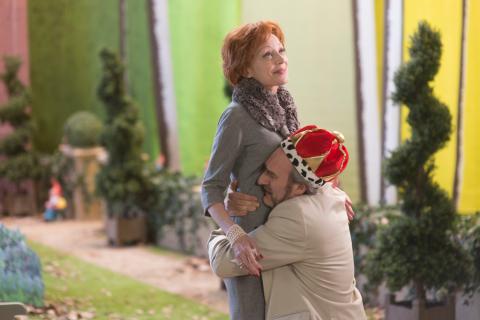Mike King on the Resnais/Ayckbourn Collaborations

These notes on the working relationship between director Alain Resnais and writer Alan Ayckbourn were written by UW Cinematheque and Wisconsin Film Festival Programmer Mike King. The final Resnais/Ayckbourn movie collaboration, Life of Riley (Aimer, Boire et Chanter) will have its only area theatrical screening at 7 p.m. on Friday, December 5, in the Cinematheque's main venue, 4070 Vilas Hall
By Mike King
Given that his early films are among the most intrinsically cinematic of their era, particularly in their bold temporal experimentation, it may seem surprising that the late Alain Resnais dedicated much of his later career to theatrical adaptations. But beginning with Mélo in 1986, Resnais regularly turned to material originally produced for the stage for his scripts, ranging from the operetta Not on the Lips to his Eurydice riff You Ain’t Seen Nothing Yet (which was screened at the 2013 Wisconsin Film Festival). During this time, no playwright captured his imagination as fervently as British playwright Alan Ayckbourn, whose work Resnais adapted three times.
In the early 1980s, Resnais began making pilgrimages to the Scarborough theater where Ayckbourn served as Artistic Director, but the director did not make himself known until the world premiere of The Revengers’ Comedies in 1989. Upon learning that Resnais was in the audience, Ayckbourn quipped in disbelief, “…and Jean-Luc Godard is in the toilet.” One of France’s most legendary auteurs taking an interest in Ayckbourn’s very British comedies perplexed even the playwright, who recalls of their meeting, “I said, 'How nice you're here. What are you doing in Scarborough?' He said, 'I've come to see the play.' I said, 'Why?' The work he'd done, I couldn't quite square it. And he said, very very simply, 'I am a fan.' To which I said, 'Oh well, mutual.'" Before long, Resnais asked for permission to adapt one of the prolific playwright’s works, which by then numbered in the high thirties.
The notion of the director of renowned masterpieces like Hiroshima, Mon Amour and Last Year in Marienbad taking a crack at his work held obvious appeal for Ayckbourn, not least because he had just suffered the indignity of his first cinematic adaptation, a botched version of A Chorus of Disapproval by Death Wish auteur Michael Winner. Still, he was mystified by Resnais’s selection: the mammoth Intimate Exchanges, an eight-part epic with sixteen endings. Of Ayckbourn’s reaction, Resnais recalled, “I remember he said he thought I was mad. I suppose that was his seal of approval.”
Though they are in effect the co-authors of several films, Ayckbourn and Resnais did not actually collaborate on their screenplays—according to Ayckbourn, he simply wished Resnais luck and “never had another artistic word on the subject.” Instead, Resnais worked with co-writers Agnès Jaoui and Jean-Pierre Bacri (also the writers and stars of Resnais’s musical followup, Same Old Song), to whittle Intimate Exchanges’s 16 hours of dialogue into a two-feature diptych entitled Smoking/No Smoking. The films won the Silver Bear at the 1993 Berlin Film Festival, and four of the five top prizes at that year’s Cesar Awards (the French Oscar equivalent).
By now, the playwright and filmmaker became close friends. In fact, Ayckbourn and his wife were the sole witnesses at Resnais’s 1998 wedding to Sabine Azéma (who starred in all of Resnais' Ayckbourn adaptations, along with virtually everything he directed after they met filming 1983’s Life is a Bed of Roses). As a wedding gift, Ayckbourn wrote her a French speaking part in his next play, House & Garden. The year also saw the release of the other non-Resnais film of an Ayckbourn play, coincidentally an adaptation of the play they met at. Retitled Sweet Revenge, it starred Sam Neill and Helena Bonham Carter.
Resnais returned to Ayckbourn’s work with increasing frequency in his final years, creating with writer Jean-Michel Ribes an adaptation of the playwright’s 67th work, Private Fears in Public Places, to great acclaim in 2006. Most recently, with Laurent Herbiet and Jean-Marie Besset, Resnais himself co-adapted Life of Riley under the nom de plume he adopted for his final three features, Alex Reval. Resnais was reportedly at work on yet another Ayckbourn adaptation, of Arrivals and Departures, when he died in March of this year. On his enduring fascination with bringing Ayckbourn’s theater to the screen, Resnais wrote:
“I still get a kick out of bringing together things that shouldn’t meet. It’s what I call the attraction of danger, of the abyss. Keeping constantly in mind the standard answer I give the question, ‘Why do you make movies?’ – ‘To see how they’re made.’ So I naturally fell for Ayckbourn’s theater, which might seem like light comedy, but that’s not at all the case. Just look at the risks he takes with dramatic construction every time. One day he said this, ‘I try to do cinema with my theater, and Resnais does theater for the cinema.’”
